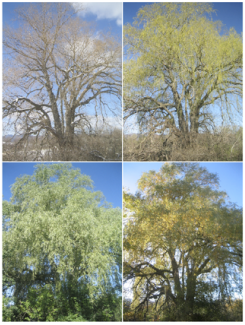 While the earth remains, seedtime and harvest, and cold and heat, and summer and winter, and day and night shall not cease. Genesis 8:22 In this verse from the story of Noah, the great flood has receded, and the ground is dry. Noah builds an altar and sacrifices to God in gratitude for having been spared. And in the verse above, God promises that the cycles that govern our seasons and our days will continue in their timeless and immutable rhythm. In autumn, with loss of light and warmth, the leaves of our deciduous trees let go of the green of photosynthesis and reveal the bright gold, russet and flame hidden beneath. As leaves let go and fall, we crunch them under our feet, and enjoy the bracing morning air, as perhaps wistfully, we watch nature begin to settle in for the winter. But as the abundance of summer decays and dies, fallen leaves turn into compost and the soil receives seeds of new life, planted with the autumn rains, awaiting the promised return of light and warmth in spring. We, too, may find autumn a time for letting go of missed opportunities, disappointments, unrealistic expectations that define us and limit our ability to envision new possibilities. Letting go of what was supposed to be and accepting what is enables us to develop a fresh perspective on who we are, and who we may become. The brilliant colors of autumn remind us that in this season we may discover in our spiritual garden more vivid hues of lovingkindness and generosity of spirit, qualities that reflect the presence of the Eternal in our human selves. This is important work in any season, but the leaves crunching under our feet remind us that today is a good day to start. It’s time once again to put the Biblical Garden “to bed” for the winter. Religious school students are harvesting fragrant herbs for making Havdalah spice boxes. We are bringing our frost-tender plants indoors to warm windows over the winter, and are wrapping the fig and the grapevine with protection from winter winds. How wonderful it is, as we prepare our spiritual gardens for the coming darkness and cold, to be assured, like Noah, that the seasonal cycle will continue, warmth and light will come again, and new green life will spring from the earth. |
AuthorsMichael Schlesinger is Temple Sinai’s Biblical Gardener. Mike has been gardening since he was eight years old. He used to grow grape vines and make wine when he lived in California. He now tends to our garden, continuing the traditions started by Catherine Walters. Archives
March 2020
|

Affiliated with the Union for Reform Judaism
30 Hagen Avenue • Cranston, RI 02920 • 401-942-8350 Office: dottie@templesinairi.org Rabbi Jeffrey Goldwasser: [email protected] |
Want to sign up for the weekly Sinai Scroll email?
Click here to receive weekly updates on Temple services, events and a message from the Rabbi. |


